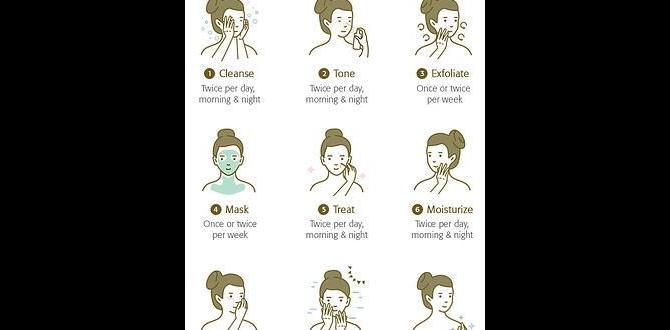Have you noticed changes in your skin as you age? Many people feel confused about how to care for their skin during this time. The good news is that creating a weekly skin care routine for aging skin can be simple and fun.
Imagine waking up to glowing skin each morning. With the right steps, that dream can become a reality. Did you know that skin can lose its natural glow over time? It’s true! But by learning how to build a skin care routine, you can bring back that youthful sparkle.
In this article, we will explore easy ways to care for aging skin. We’ll break it down step by step. What products should you use? How often should you apply them? If you’re ready to transform your skin, read on!
Weekly Guide: How To Build A Skin Care Routine For Aging Skin

Weekly How to Build a Skin Care Routine for Aging Skin
Creating a skin care routine for aging skin can feel overwhelming. Start by understanding your skin type. Cleanse gently and moisturize daily. Did you know that applying sunscreen can prevent future wrinkles? Consider adding vitamins C and E for extra protection and repair. Using natural ingredients like aloe vera or coconut oil can help hydrate and rejuvenate skin. Small changes can lead to big results, making your skin healthier and more youthful!Understanding Aging Skin
Explanation of skin aging process. Common concerns associated with aging skin.As we get older, our skin naturally changes. This happens because our body produces less collagen and elastin. These are the proteins that keep our skin firm and smooth. With age, you might notice wrinkles, dryness, or even dark spots. Here are some common concerns:
- Wrinkles are lines that form on the skin.
- Dryness makes skin feel rough and flaky.
- Uneven tone can lead to dark spots or redness.
Understanding these changes helps us care for our skin better.
What are the main changes in aging skin?
Aging skin loses elasticity, hydration, and youthful glow. Understanding these changes can help in choosing the right skincare.
Essential Components of an Aging Skin Care Routine
Key products: cleansers, serums, moisturizers, and sunscreens. Importance of ingredients that target aging, such as retinoids and antioxidants.Creating a solid skin care routine for aging skin is like cooking a delicious meal. You need the right ingredients! Start with a gentle cleanser to wipe away the day’s dirt. Add a serum with ingredients like retinoids, which can help reduce wrinkles. Don’t forget a thick moisturizer to keep your skin happy and plump! Finally, slather on sunscreen to protect against sun damage—because nobody wants to look like a raisin!
| Product Type | Key Ingredients |
|---|---|
| Cleansers | Gentle formula |
| Serums | Retinoids, antioxidants |
| Moisturizers | Hydrating elements |
| Sunscreens | SPF 30 or higher |
Remember, what you put on your skin matters! Look for ingredients that fight aging. Your skin will thank you, and you might even feel a little younger. It’s a win-win!
Daily Skin Care Steps for Optimal Results
Morning routine: cleansing, moisturizing, and sun protection. Evening routine: cleansing, treatment applications, and hydration.Start your day fresh with three simple steps. First, cleanse your face to remove dirt. Next, moisturize to keep your skin soft. Finally, don’t forget sun protection! This shield keeps your skin safe from harmful rays.
At night, follow another routine. First, cleanse again to wash away makeup and grime. Then, apply any special treatments like serums. Lastly, hydrate well to help your skin recover while you sleep. These steps ensure your skin looks healthy and young!
Why is sun protection important?
Sun protection is key to preventing skin damage and aging. It helps shield your skin from harmful UV rays that can cause wrinkles and dark spots.
Daily Skin Care Steps
- Morning: Cleanse, Moisturize, Sun Protection
- Evening: Cleanse, Treat, Hydrate
Weekly Treatments for Enhanced Care
Importance of exfoliation: types and frequency. Masks and treatments that rejuvenate aging skin.Weekly skin care treatments can greatly improve your skin. Exfoliation is key. This removes dead skin and helps new skin show. You can exfoliate twice a week using scrubs or chemical peels. Masks and special treatments also help rejuvenate aging skin. They can give your face a fresh look and feel. Popular choices include hydrating masks and firming treatments. Remember, consistency is important for the best results!
What types of exfoliation should I use?
Use gentle scrubs or enzyme-based peels. These help without being too harsh on your skin.
Recommended Exfoliation Frequency
- Scrubs: 1-2 times a week
- Chemical Peels: every 2-4 weeks
What are the best masks for aging skin?
Hydrating and firming masks work best. They can improve texture and promote youthfulness.
Seasonal Adjustments to Your Routine
How skin needs change with the seasons. Recommended adjustments for summer and winter care.Skin changes like a chameleon with the seasons. In summer, it’s hot and sticky, making lightweight moisturizers your best friend. Your skin can get thirsty too! Don’t forget sunscreen to keep it safe from those sneaky UV rays. Winter, on the other hand, can be like a desert. Your skin craves hydration, so switch to richer creams. Here’s a quick table to help you remember:
| Season | Skin Needs | Suggested Products |
|---|---|---|
| Summer | Lightweight and hydrating | Gel moisturizers, sunscreen |
| Winter | Rich and nourishing | Cream moisturizers, hydrating serums |
Adapting your routine with the weather can keep your skin happy. Just remember, it’s not your skin being picky—it’s just asking for what it needs!
Diet and Lifestyle Options to Support Aging Skin
Role of nutrition and hydration in skin health. Impact of stress management and sleep on skin appearance.Nutrition and hydration play important roles in keeping skin healthy. Eating fruits, vegetables, and whole grains gives your skin the vitamins it needs. Drinking enough water keeps your skin plump and fresh. Lack of stress and enough sleep can also improve your skin’s look. When you’re stressed, your skin may show it. Getting enough rest helps your skin repair itself. Here are some quick tips to support your skin:
- Eat a colorful diet rich in vitamins.
- Stay hydrated by drinking water daily.
- Practice stress relief with fun activities and exercise.
- Get 7-9 hours of sleep each night for repair.
Make these changes to support your skin and look your best!
How can diet help aging skin?
A healthy diet rich in nutrients can slow aging signs on skin. Vitamin C and antioxidants from fruits and veggies play a huge role in skin health, maintaining its glow.
Common Mistakes to Avoid
Misuse of products or overexfoliation. Ignoring professional advice or dermatological treatments.A few common slips can hurt your skincare journey. First, using too many products can harm your skin rather than help it. Overexfoliating can make your skin irritated and dry. Avoid strong scrubs or acids each day. Next, don’t ignore advice from experts. Professionals can guide you with treatments that suit your skin’s needs. Listen to them to get the best results.
What are the common mistakes in skincare?
Common mistakes in skincare include using too many products and not following expert advice. Both can lead to skin issues.
Conclusion
In conclusion, building a weekly skincare routine for aging skin is essential. Focus on cleansing, moisturizing, and applying sunscreen daily. Don’t forget to add serums or treatments with ingredients like retinol or hyaluronic acid. Start small and adjust as needed. For more tips, explore articles on skincare ingredients and routines to enhance your beauty journey!FAQs
Certainly! Here Are Five Related Questions On How To Build A Skin Care Routine For Aging Skin:Sure! To make your skin look good as you get older, start by cleaning your face twice a day with a gentle wash. Next, use a moisturizer to keep your skin soft and smooth. You should also use sunscreen to protect your skin from the sun’s harmful rays. Finally, don’t forget to drink plenty of water and eat healthy foods, like fruits and veggies, for extra help!
Sure! Please ask your question, and I’ll be happy to help with a clear and simple answer.
What Are The Essential Ingredients To Look For In Products For Aging Skin?When choosing products for aging skin, look for moisturizing ingredients like hyaluronic acid. This helps your skin stay soft and plump. You should also look for antioxidants like vitamin C, which protect your skin from damage. Retinol can help too, as it makes your skin feel smoother. Lastly, sunscreen is super important to keep your skin safe from the sun.
How Often Should I Exfoliate Aging Skin, And What Methods Are Recommended?You should exfoliate aging skin about once or twice a week. This helps remove old skin and keeps it fresh. Good methods include using gentle scrubs or special exfoliating wipes. You can also try gentle chemical exfoliators, which are safe for your skin. Always remember to put moisturizer on after you exfoliate!
What Is The Best Order To Apply Skincare Products For Optimal Absorption And Effectiveness?To get the best results from your skincare, start by washing your face with a gentle cleanser. Next, pat your face dry and apply a toner if you have one. After that, use any serums for extra help with skin problems. Then, put on a moisturizer to keep your skin soft. Finally, finish with sunscreen during the day to protect your skin from the sun.
How Can I Incorporate Sun Protection Into My Daily Routine For Aging Skin?You can protect your skin from the sun every day! Start with a sunscreen with SPF 30 or higher. Apply it on your face and any skin exposed to the sun. Remember to put on sunscreen before you go outside. Also, wear a hat and sunglasses to keep more skin safe.
Are There Any Specific Lifestyle Changes I Should Consider To Complement My Skincare Routine For Aging Skin?Yes, there are some easy changes you can make. Drink plenty of water to keep your skin hydrated. Eat fruits and vegetables; they help your skin stay healthy. Try to get enough sleep each night; it gives your skin time to repair. Lastly, remember to protect your skin from the sun by wearing sunscreen.
